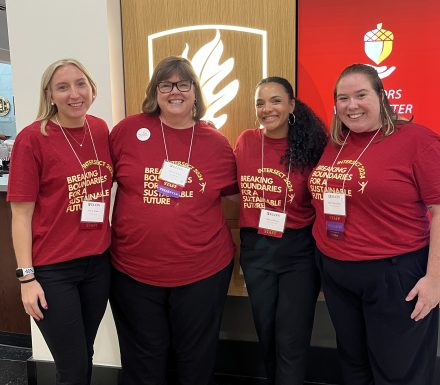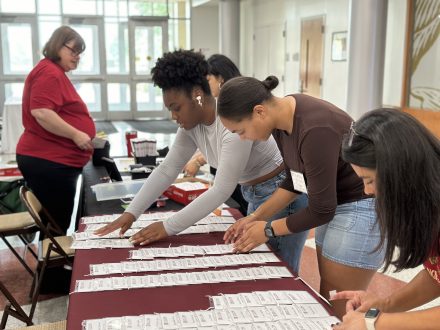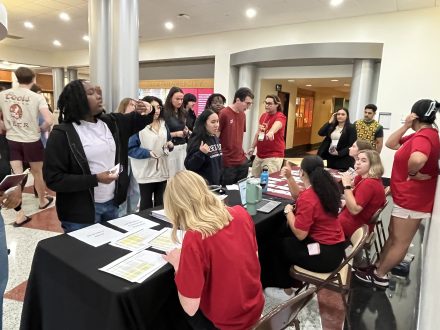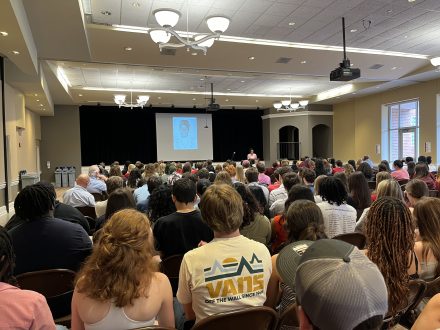Leslie Aviles Mendoza ‘25 and Taylor Scott ‘25 exemplify the power of student leadership, using their roles as student coordinators at the Center for Race, Ethnicity, and Diversity Education (CREDE) to enhance community well-being.
At the heart of the student co-curricular experience at Elon are the leadership opportunities that nurture and develop students. These opportunities provide an outlet for expression and enhance student well-being. Leslie Aviles Mendoza ‘25 and Taylor Scott ‘25 are testaments to the transformative power of student leadership and its impact on enhancing student well-being.
Aviles Mendoza and Scott have been student coordinators at the Center for Race, Ethnicity, and Diversity Education (CREDE) since their second year at Elon. Aviles Mendoza focuses on programming efforts within El Centro, and Scott works with the Black Student Success initiative.
“Student coordinators are integral to the CREDE and El Centro as they work closely with professional staff to promote race and ethnicity, social justice and identity development education,” said MJ Larazabal, assistant director of the CREDE.
Student coordinators lead various signature programs hosted by the CREDE and El Centro, such as Hispanic Heritage Month, Black History Month, and Asian and Pacific Islander Heritage Month. These programs largely center on social identities and advocacy for ALANAM (African-American/Black, Latinx/Hispanic, Asian/Pacific Islander, Native American, Alaskan Native, and Multiracial) identities and backgrounds.

Another signature program that the CREDE implements in conjunction with the Center for Leadership is the Intersect Diversity and Leadership Conference, an annual student-led conference that examines diversity, leadership, and the intersections between the disciplines.
The power of meaningful relationships
During the 2023 and 2024 Intersect conferences, Aviles Mendoza served as the student director of marketing, while Scott served as the student director of education. However, becoming the education and marketing student directors was not by happenstance. Aviles Mendoza and Scotts’ relationships with CREDE staff, such as Sylvia Muñoz, director of the CREDE and assistant dean of Student Life, and other student coordinators, such as Valentina Echavarria ‘24, were influential to their journey in becoming student directors.
“When Sylvia offered me the position of student director of marketing, I really wasn’t sure if I wanted to take on such a big role. But Valentina and I grabbed food, and she explained the role to me. After that, I thought ‘OK, I’ll do it.’ So through Valentina and Sylvias’ guidance, I took on the role,” Aviles Mendoza said.
Scott echoed Aviles Mendoza sentiments, also being influenced by Muñoz to take on a student director role.
“As a Black Student Success coordinator, I was able to get to know Ms. Sylvia and work with her on different projects in the CREDE,” Scott said. “By the end of my sophomore year, she had brought Intersect to my attention. She felt that I would be a good fit for the student director of education and I accepted the role.”

Championing diversity and leadership
As student directors of the Intersect conference, Aviles Mendoza and Scott embraced the opportunity to lead, advocate for diversity and enhance their professional development.
Aviles Mendoza demonstrated a commitment to the conference, emphasizing teamwork and meticulous organization. Her dedication was especially illustrated in the early stages of planning the 2024 conference, as she helped plan while abroad in Seville, Spain. Though she had to navigate the time difference, she was motivated by her unique identities as a first-generation college student and first-generation American.
“I think because I’m a first-gen and have parents who are immigrants, seeing such a big event come together and recognizing how much work I put into it is very rewarding,” Aviles Mendoza said. “It wasn’t just something I was doing for myself—it was something I was doing for my mom as well.”

As the student director of education, Scott’s ability to navigate challenges, including adapting to changes in diversity education and addressing shifting societal climates, highlights her resilience. Like Aviles Mendoza, Scott’s resilience and dedication in the planning process were motivated by her identity. One particular movement was when she reflected on her racial identity. She spoke with the Intersect keynote speaker, Donisha Rita Claire Prendergast, Bob Marley’s granddaughter, to share her perspective as a student about the campus atmosphere and climate to help inform Prendergast’s keynote address.
“As a student coordinator, I work from the perspective of a Black woman. So being able to connect with her as a Black woman who has a platform and who works in advocacy was a special moment for me,” Scott said.
Experiential learning in full effect
Aviles Mendoza and Scotts’ experience as student directors of the Intersect conference has provided experiential learning opportunities, allowing them to apply classroom knowledge in a real-world setting. As strategic communication majors, the experience has strengthened their branding, marketing, event management and teamwork skills.
Scott discussed how CREDE staff members, particularly her supervisors Simone Royal ’17, interim associate director of the CREDE, and Abdul-Malik Harrison, program coordinator for the CREDE, encourage professional growth for student coordinators.
“They always encourage us to focus not just on what we can contribute to the CREDE while we’re here, but also on how this experience will help us grow professionally,” Scott said.
Scott particularly wanted to improve her public speaking skills. She described how her role as a student director during the conference assisted her in developing this skill by introducing the keynote speaker. This experience, though nerve-wracking, was pivotal for her professional development.
“I introduced the keynote speaker, and it went well. My mom and family were so proud, which made it a really special moment for me career-wise. There was also an unexpected shift in the script, and I had to close the keynote impromptu. I wasn’t expecting it, but I was prepared because I had worked on building my self-confidence,” Scott shared.
Aviles Mendoza also highlighted how serving as a student director fostered her professional growth, improving her ability to accept constructive feedback and strengthening her problem-solving skills.
“Being able to receive criticism without taking it to heart was great for me to learn. Knowing that it’s not that they don’t like me but instead knowing that it is something that needs to be fixed is what helped me the most,” said Aviles Mendoza.

Enhancing community well-being
Aviles Mendoza and Scott’s experiences and relationships within the CREDE have been vital in advancing their confidence and nurturing professional and personal growth. However, these experiences have also been essential in helping them build community.
“The CREDE allows me to have a safe space filled with resources to help me grow professionally and personally. When I am not working, the CREDE continues to be a space where I can be myself,” Scott expressed. “Even when I am not on shift, I receive so much support from the staff. I am able to build connections with so many people who come in and out of the space. It feels like family and I know that at the end of the day, I am always welcome in the space to be my authentic self.”
Larazabal also described how Aviles Mendoza had used her roles to build a community for not just herself but her peers as well.
“Leslie is the type of student who wants to build spaces and community for others, which is why she became a student director of the Intersect conference two years in a row,” Larazabal said. “In dealing with others, she puts their humanity first. As a peer to others, she understands college students’ wants, needs and areas of growth, and offers opportunities to facilitate the growth of others.”
Aviles Mendoza and Scott exemplify how student leadership can enrich the Elon experience, transcending professional development to create spaces of belonging and fostering community. Their experiences illustrate how student leadership can enhance community well-being by embracing challenges, engaging in collaboration and championing inclusivity.



